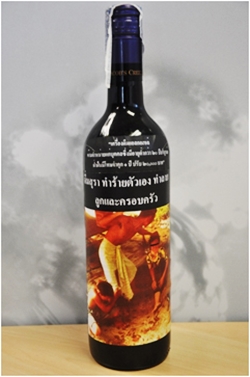Pattaya business leaders fear four draft amendments to Thailand’s Alcoholic Beverage Control Act now under consideration will deal another blow to the country’s tourism industry.
The measures, explained to the Pattaya Business & Tourism Association at its Nov. 17 meeting at the A-One Royal Cruise Hotel, would prohibit many outlets from selling cocktails with fruit or vegetable juice, ban all alcohol sales within 500 meters of a school, require graphic warning labels to cover 30 percent of bottles and cans, and explicitly ban drinking while driving.
 Imagine ordering a 5,000 baht bottle of wine in a fancy restaurant, and when it arrives at your table you see a label showing a drunken man beating his wife as the child begs him to stop.
Imagine ordering a 5,000 baht bottle of wine in a fancy restaurant, and when it arrives at your table you see a label showing a drunken man beating his wife as the child begs him to stop.
Roundly criticized by the World Trade Organization, public health groups and business interests inside and outside of Thailand, the new amendments to the already controversial law would negatively impact Pattaya and other tourist area more than other regions of the country, PBTA President Jamroon Vitsavachaipan said.
“The proposed legislation is still too imprecise,” he said. “It needs to have language added so that tourism businesses are not affected and warning labels on the bottle should have text business owners would not object to.”
To help local bar and restaurant owners understand the threat the draft amendments pose, the PBTA invited Plangsit Sutpreeyasri of the Thai Alcohol and Beverage Business Association, to brief members on the proposals. While government officials claim the amendments are aimed at stemming alcohol use among teens and drivers, the proposals are yet another blunt instrument that can do more damage than good, he said.
The most controversial proposal, especially internationally, is a requirement that alcohol bottles be given the same graphic warning labels as cigarettes, with scenes depicting mutilated bodies from car crashes and husbands beating their wives. Restaurant owners roll their eyes imaging the reaction customers will have when presented a 5,000 baht bottle of wine adorned with such photos.
Business owners are equally outraged over proposals that ban the mixing of drinks with fruit juice, syrup or fruit-scented water. Such drinks are allowed in “entertainment areas” but the definition of those areas under current laws is so unclear, bar owners fear Screwdrivers and Bloody Marys will be taken off most menus in Thailand.
Plangsit also explained that areas within 500 meters of schools would be designated alcohol-free zones. The same provision also attempts to crack down on unlicensed bars and street stalls that sell alcohol, prohibiting use in public areas except for licensed clubs or private residences.
Finally, the proposals would specifically outlaw drinking alcohol while operating motorized vehicles.
Jamroon contended that, despite the vague provision about selling alcohol in public areas, the revised law would penalize legitimate businesses more than the ad-hoc bars that pop up on curbs after midnight and at unlicensed entertainment venues.
Other critics agree, saying cracking down on unlicensed venues – many of which use illegally imported liquor – would do more to curb alcohol abuse and boost tax revenues than any of the new measures. Others point out Thailand’s entire alcohol tax code is backwards to the rest of world’s, which tax beverages based on the amount of alcohol they contain.
Thailand’s laws, by contrast, tax beer and low-alcohol beverages at more than twice the rate of whiskey and other heavy liquor. Additionally, angering the WTO, cheap Thai-made whiskey and rum is given a tax break over imported spirits. Thai government officials have said taxing cheap liquor higher would hurt the poor, a claim Thai health group scoff at, arguing the government isn’t worried about alcoholism, as long as it only affects the rural poor.
Combined with existing provisions that ban any alcohol advertising outside or inside a club, bar or restaurant, the latest Alcoholic Beverage Control Provisions “can only impact tourism further in Pattaya,” Jamroon said.




